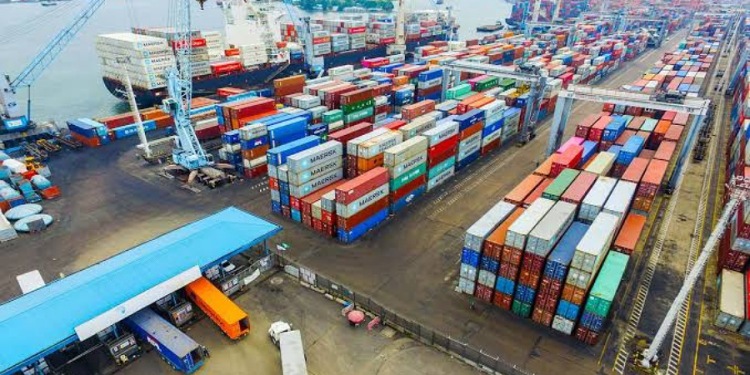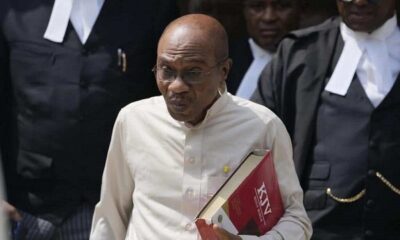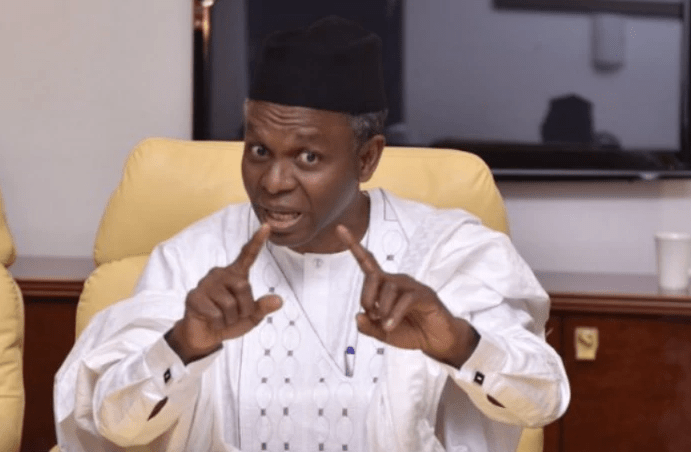Latest News
Trouble in Nigerian Ports, as CBN e-invoice policy causes strike action
Published
4 years agoon
By
Jessy Oche
The Central Bank of Nigeria’s implementation of the e-evaluation and e-invoice policy has caused major problems in ports.
Port activities at Tin-Can Island and the Ports & Terminal Multipurpose Limited may have come to a halt, following the withdrawal of services by agents and freight forwarders working at the two ports.
If their demands are not met, the agents have vowed to expand the strike to all of Lagos State’s ports, including Apapa and the Kirikiri Lighter Terminal.
The Central Bank of Nigeria had in a circular to all authorised dealers and the general public announced the introduction of e-invoicing for all imports and exports in the country, effective February 1, 2022.
Nairametrics’s also reported that Nigerian House of Representatives had asked the CBN to halt the implementation of the policy. This was prompted following the adoption of a motion moved by Honourable Leke Abejide (APC, Kogi)
The central bank however refused to communicate a new date and went on to effect the new policy. Hence, freight forwarders operating at both the Tin-Can Island and PTML last week gave the authority 72 hours to address the technical glitches facing the newly introduced e-valuation system or face industrial action.
In what appears like a follow-up to their earlier threat, the aggrieved freight forwarders on Monday commenced the withdrawal of their services till further notice.
Sunny Ugorji, the Assistant Secretary, PTML Chapter of the Association of Nigerian Licensed Customs Agents, stated that the agents were not against the platform but the implementation process.
Ugorji, said the implementation showed the officers of the Nigerian Customs Service had increased the duties on imported cars without the notice of the agents.
He said, “We only withdrew our services because of the e-valuation, there is no work; we have withdrawn our services until they correct the e-valuation system. We are not against e-valuation, what we are against is the implementation of the platform. The implementation is indicating that the Nigeria Customs Service has increased duties without informing us. I don’t see why when they say e-valuation; it simply means we are going to observe port operations with no much interface which is good”
He added, “We have succeeded in withdrawing our services both at the PTML Command and Tin-Can. By tomorrow (Tuesday) we are going to Apapa. On Wednesday, we are going to KLT to make sure we all speak with one voice.”
The Chairman of the National Association of Government Approved Freight Forwarders, PTML chapter, George Okafor, said, “We just withdrew our services; all the agents have withdrawn their services at PTML. Our attention was only at PTML but it has now extended to Tin-Can. We are on it until the government speaks to us. We gave the Customs Controller-General 72 hours to talk to us but until now, he hasn’t done that. So we are withdrawing our services until the Customs talk to us.”
Muhammad Yakubu, the Public Relations Officer of the PTML Command, NCS, acknowledged the discontinuation of service, noting that the command was just executing the government’s e-valuation policy.
He said, “They have been on strike since we came to the office. I keep on telling them that this thing is beyond us (Customs), it is a Federal Government policy and we are just here to implement the policy. They should talk to the Federal Government.”
The PRO, Tin-Can Island Command, NCS, Uche Ejesieme, advised the protesters to act within the ambit of the laws.
- To replace hard copy final invoices as part of the documentation necessary for all import and export transactions, the e-evaluator and e-Invoice were introduced.
- Imports and exports having unit prices greater than 2.5% of verified global checkmate prices will be investigated and will not be allowed to complete Form M or Form NXP successfully.
- Unless the electronic invoice has been authenticated by Authorised Dealer Banks and the relevant payment documentation has been provided, no importer/exporter may make a payment to a foreign supplier’s credit.
You may like
-


CBN removes deposit limits, raises weekly withdrawal cap
-


Tinubu orders end to ASUU strikes as Alausa insists demands already met
-


Dollar to Naira exchange rate today, Sunday November 2, 2025
-


Dollar to Naira exchange rate today, Tuesday October 28, 2025
-


Black Market Dollar to Naira Exchange Rate Today September 25th 2025
-


Appeal Court nullifies Emefiele’s asset forfeiture, orders fresh trial

37 miners dead, 25 hospitalised after suspected gas leakage in Plateau

Courts are last line of defense against election fraud – Adeyanju

Cardi B confirms breakup with Stefon Diggs amid cheating claims

Father storms Gym with police to arrest man accused of impregnating daughter

Over 30 Plateau indigenes killed, 707 displaced in Kwara attack – Riyom Deputy Chairman

El-Rufai spends second night in EFCC custody over N432bn probe

Benue CP decorates 456 newly promoted officers

We Can’t move forward like this – Igwe Agubuzu tells Tinubu to release Nnamdi Kanu

APC suspends Omale, Abba over alleged anti-party activities

Ash Wednesday, Ramadan alignment a divine call for unity — Inalegwu Adeje Ejembi

David Mark leads ex-PDP chieftains to capture Benue South for ADC in 2027


